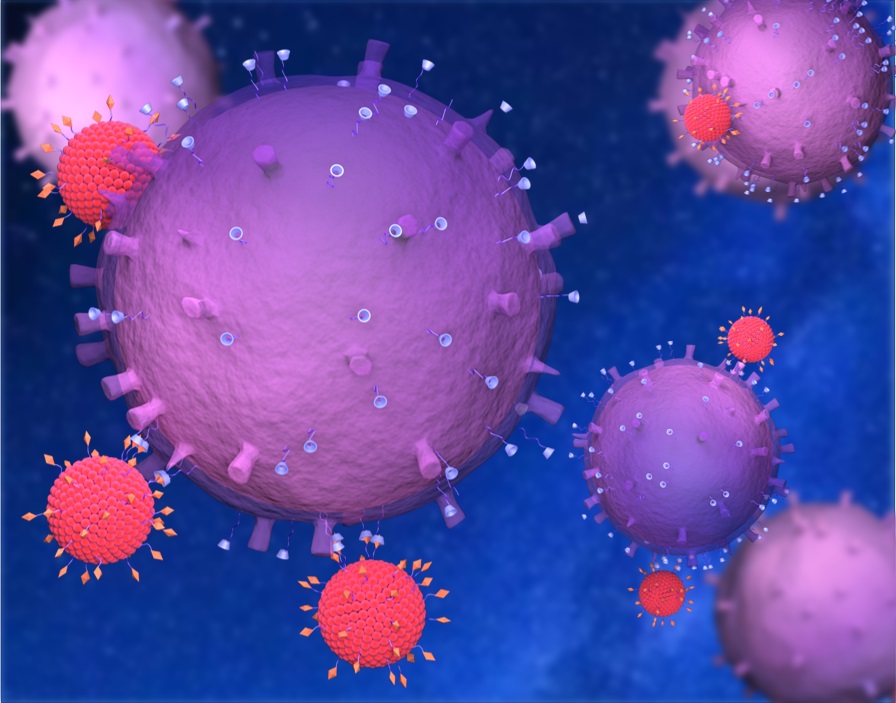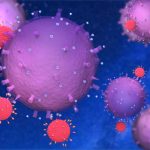 UM has developed a supramolecular ‘cell-hitchhiking’ drug delivery system to treat inflammatory diseases
UM has developed a supramolecular ‘cell-hitchhiking’ drug delivery system to treat inflammatory diseases
To overcome low delivery efficiency and poor specificity of traditional formulations, a research group led by Prof Wang Ruibing in the Institute of Chinese Medical Sciences (ICMS), University of Macau (UM), and another research group led by Prof Zhong Zhiyuan at Soochow University, proposed the concept of ‘supramolecular cell’ (cells with synthetic receptors anchored on the surface). According to the study, the supramolecular ‘cell-hitchhiking’ drug delivery system has significantly improved targeted delivery efficiency in treating inflammatory diseases and achieved desirable therapeutic efficacy for acute lung inflammation in mice.
Titled ‘Bioorthogonal Supramolecular Cell-conjugation for Targeted Hitchhiking Drug Delivery’, the research article has been published in Materials Today, one of the top academic publishing platforms and the flagship journal of Elsevier.
Currently, none of the existing traditional formulations, nano-formulations, or synthetic targeting formulations could achieve desirable therapeutic effects in treating cancer, cardiovascular, and central nervous system diseases. This is likely attributed to the clearance of these formulations by the reticuloendothelial system, difficulty in crossing physiological barriers before reaching the diseased tissue, and poor targeting efficiency. Cells, as the basic unit and ‘self’ components of organisms, possess many inherent advantages that facilitate targeted drug delivery, such as excellent biocompatibility and capability to escape from the reticuloendothelial system.
In addition, different types of cells have different physiological functions, such as the inflammatory tropism of immune cells and homing effects of stem cells, which endow the corresponding cells with strong, intrinsic targeted translocation. However, only a few studies have addressed the use of cells as drug carriers, and the current strategies for constructing cells-based drug carriers are either too sophisticated or may lead to systems with rather poor stability. To address these issues, the researchers selected macrophage as a model cell to construct a supramolecular ‘cell-hitchhiking’ drug delivery system to deliver therapeutic payload to inflammatory tissues for effective alleviation of local inflammation, attributed to the inflammatory tropism of macrophage. This novel drug delivery system can deliver a small-molecule Chinese medicine, quercetin, specifically to the inflammatory lungs of mice to effectively alleviate local inflammation. This supramolecular ‘cell-hitchhiking’ drug delivery system not only offers a new strategy for targeted treatment of inflammatory diseases, but also provides new insights and theoretical basis for the design and development of targeted drug delivery systems based on live cells.
This study was funded by the Science and Technology Development Fund, Macau SAR (File no. 0121/2018/A3 and 0007/2020/A) and the National Natural Science Foundation of China (File no. 21871301). Associate Professor Wang Ruibing from UM and Prof Zhong Zhiyuan from Soochow University are the corresponding authors. UM doctoral student Gao Cheng, research assistant Cheng Qian, and master of science student Wei Jianwen are the co-first authors. Prof Simon Lee Ming Yuen also made important contributions to this study. Details of the study can be found at https://www.sciencedirect.com/science/article/pii/S1369702120302157 .


